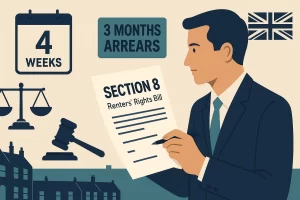The Government has confirmed that the Renters’ Rights Bill received Royal Assent on 27 October 2025, becoming the Renters’ Rights Act. Ministers describe it as the biggest shift in renting rules in a generation, affecting England’s ~2.3m landlords and ~11m tenants.
Headline changes at a glance
- Section 21 (‘no-fault’) evictions abolished – the Act ends Section 21 and moves all assured tenancies to a single periodic system. Repossession will run through strengthened Section 8 grounds instead.
- Strengthened possession grounds – including sale or moving in, plus tightened rules to curb “back-door” evictions via excessive rent increases. Details of the new/updated grounds will sit under the Act’s Section 8 framework.
- Private Rented Sector (PRS) Ombudsman – a new, binding redress scheme with powers to order apologies, remedial works, information disclosure and compensation.
- National PRS Database – landlords will register and use this to demonstrate compliance and help tenants verify information.
- Pets – tenants gain a right to request a pet; landlords must not unreasonably refuse and may require pet insurance to cover damage.
- Decent Homes Standard & Awaab’s Law applied to PRS – legal timeframes and standards for hazard remediation (including damp/mould) will extend into the private sector.
- No rental bidding & fair marketing – bans on asking for/accepting offers above the advertised rent; unlawful to refuse applicants because they have children or receive benefits.
Important: The Act is now on the statute book, but not everything starts immediately. The Government says it will outline the rollout/commencement in the coming weeks. Sector bodies expect staged implementation through 2026. Plan now.
What this means for possession strategy
With Section 21 going, grounds-based possession becomes central. Expect updated grounds (sale, moving in, repeated serious arrears, anti-social behaviour, etc.) and review your evidence standards:
- Arrears: keep watertight ledgers, notices, and communications.
- Sale/move-in grounds: prepare proof of genuine intention (marketing evidence, conveyancer letters, statutory declarations where applicable).
- Conduct/ASB: incident logs, neighbour statements, police reports.
(Full ground lists and exact thresholds will sit in the Act and secondary regulations—watch for commencement guidance.)
Five practical steps to take now
- Audit your portfolio for compliance gaps
- Gas, EICR, smoke/CO alarms, EPC, licensing.
- Start mapping your data for the PRS Database registration.
- Update tenancy templates & processes
- Shift to periodic tenancy assumptions; align notice flows, rent review clauses (and evidence of market level) with the Act’s anti-“back-door eviction” protections.
- Pet policy refresh
- Draft a reasonableness test for refusals and specify pet insurance requirements where you’ll consent.
- Prepare for the PRS Ombudsman
- Create internal complaints handling timelines and templates; decide who signs off remedies/compensation to avoid escalation.
- Plan for the Decent Homes Standard & Awaab’s Law
- Build damp/mould triage with response SLAs and photo logs; line up contractors for 24-hour emergency hazard call-outs (once commencement dates apply to PRS).
Key dates & what we’re watching
- 27 Oct 2025: Royal Assent. GOV.UK
- Commencement: Government to announce rollout (staged). Industry commentary suggests well into 2026 for the new tenancy regime; we’ll confirm once the statutory instruments land.
Quick Q&A
Can I still serve a Section 21 notice today?
Not once the commencement switches the regime over — timing to be confirmed. Until then, existing law applies; but build contingency for grounds-based routes now.
Will fixed terms disappear?
Yes—all assured tenancies become periodic once the new regime starts.
Can I refuse pets outright?
You’ll need a good reason to refuse; you can require pet insurance to cover damage. Update your tenancy documents and referencing.
What about rent rises mid-tenancy?
The Act targets excessive, above-market increases used to force tenants to leave. Expect tighter challenge mechanisms; keep evidence of market rent.
What happens to existing tenancies—how does the Act affect them?
Nothing changes until commencement. The Government has said it will set out the rollout timetable “in the coming weeks.” When the new regime starts, all existing assured and assured shorthold tenancies will move onto the single periodic system created by the Act (i.e., rolling tenancies with no fixed end date). From that point, new Section 21 notices cannot be used, and possession will run through the strengthened Section 8 grounds. (Exact transition dates and any staged phasing will be confirmed in the commencement regulations.)


